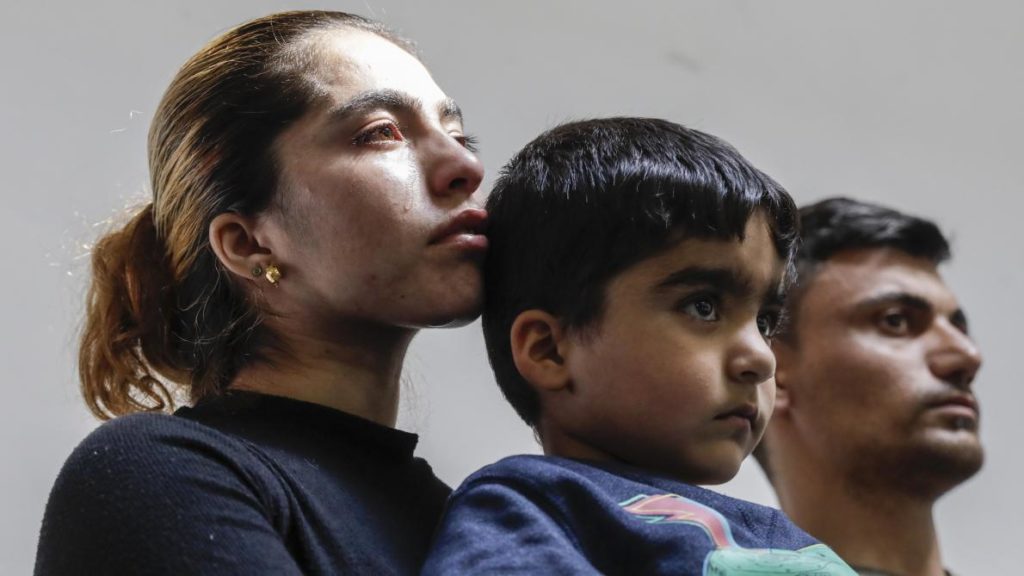Belgian prosecutors requested a suspended prison sentence for a police officer who fired at a moving van, killing a toddler, as they affirmed that he was aware that children were on board.
The sentence request concludes the second day of a high-profile trial over the death in 2018 of 2-year-old Mawda, an Iraqi-Kurdish child whose tragic death by a stray bullet has drawn international media attention and calls for justice from celebrities ranging from director Ken Loach to Pink Floyd frontman Roger Waters.
Prosecutors said that the actions of the officer, identified as Victor J., were reckless and disproportionate to the situation but that the evidence did not support the theory that there was an intention to kill.
"No element can establish that Victor J. was animated by an intention to kill or that he was aware that his actions could result in death," Advocate-General Ingrid Godard told the court, adding that the defendant's actions constituted a "clear lack of prudence and foresight."
The policeman is being tried for involuntary manslaughter over the fatal outcome of a police chase, during which he opened fire on a van carrying over 20 people, including Mawda, her older brother, and her parents, with the intention to hit the vehicle's tires.
In her statements to the court in Mons, Godard confirmed that children were shown through the van's windows in an attempt to get police officers to stop the chase.
Contradicting the officer's claim that he was unaware that there were any children onboard, Godard also said that the defendant's patrol was informed via radio that there were children in the van before he fired the shot, which killed Mawda on the spot.
When the van came to a stop, Godard said that a police officer gave a cardiac massage to Mawda before handing her over to the emergency services, which were unable to resuscitate the toddler.
Godard's comments followed a morning of emotional testimonies delivered by both of Mawda's parents, who told the court that the police treated them "inhumanely" as they arrested them following their daughter's death.
Shamden Shawi, Mawda's father, said it was neither of his two children who were exposed through the windows, adding that there was another family with children onboard.
"It has been two years but I have not forgotten anything. It's as if I was still there," he said, adding that his family was traumatised by the events: "My son cries when he sees a police officer in the street. My wife and I are no longer ourselves."
"My wife and I were the last ones to come out of the van. When I came out, I took Mawda from the arms of her mother. There was a fountain of blood."
"I don't have the words to describe this situation. They treated us in an inhumane manner," he continued, adding: "When the ambulance arrived, they did not let us accompany our daughter."
The next time that they were allowed to see Mawda was after her autopsy, Shawi said.
Contradictions and inconsistencies
The address of the advocate-general revealed a series of inconsistencies and contradictions both in the plaintiffs and the defendants' statements in court as well in the investigation case file.
Godard said that, in comments that he denied on Tuesday, Victor J. had told police oversight body, Committee P, that he had seen a child through the window.
"He acknowledges that he did not receive any order to shoot but said that he saw his actions as proportionate and necessary," Godard said. "He added that he would not have shot if he knew that there was a child on board."
Godard's also said that, in the investigative file, a medical doctor had said Mawda had died from a cranial trauma after she was shown by the window, and confirmed that the officer had initially concealed the fact that he had fired his gun.
The advocate-general also said that the evidence showed that Mawda was in the front part of the van at the moment of her death, contradicting the family's statements that she was in the back with her family.
The prosecution concluded that the officer did not act in a reasonable manner and that he "should have known that the situation would get out of control."
"Victor J. should not have fired his gun," public prosecutors said. "Even if he hides behind a lack of information or poor training, he shot knowing that there was at least one child on board."
Citing the fact that the defendant kept "pointing the finger elsewhere and refusing to take any responsibility," the prosecution's requested one year suspended prison sentence.
If found guilty by the jury, the suspended sentence would see the officer escape any immediate time in prison. He would only be jailed if he is sentenced and convicted again.
Later on Tuesday, the prosecution demanded a maximum penalty of 10 years and 7 months imprisonment for the driver of the van and the suspected people smuggler on charges of vicious obstruction of traffic with aggravating circumstances leading to death as well as armed rebellion.
Gabriela Galindo
The Brussels Times

